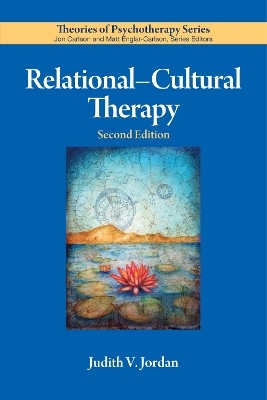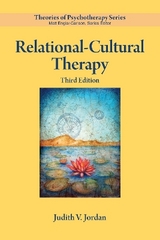
Relational–Cultural Therapy
American Psychological Association (Verlag)
978-1-4338-2826-3 (ISBN)
- Lieferbar
- Versandkostenfrei
- Auch auf Rechnung
- Artikel merken
In this second edition of Relational–Cultural Therapy, Judith V. Jordan returns to explore the history, theory, and practice of relationship centered, culturally oriented psychotherapy.
Western psychological theories generally depict human development as moving from dependence to independence. In contrast, RCT is built on the premise that, throughout the lifespan, human beings grow through and toward connection, and that we need connections to flourish. This theory views isolation, at both individual and cultural levels, as a major source of suffering. The goal of the relational therapist is to deepen the therapeutic relationship and, ultimately, the client’s relationships outside of therapy. The client’s relational images—positive or negative expectations created by past relationships – influence current relationships, and a negative image can result in disconnections between people and society.
This essential primer, amply illustrated with case examples, is perfect for graduate students and seasoned practitioners alike. This new edition highlights new research on the effectiveness of RCT in a variety of real-world situations—such as developing team-building exercises in workplaces, and providing a theoretical frame for an E.U.-sponsored conference on human trafficking.
Judith V. Jordan, PhD, is the director of the Jean Baker Miller Training Institute and founding scholar at the Stone Center of Wellesley College. Dr. Jordan is an assistant clinical professor of psychiatry at Harvard Medical School. She and colleagues developed a relational model of human development and clinical practice (relational–cultural theory) that emphasizes the centrality of relationship in our lives. After graduating Phi Beta Kappa and magna cum laude from Brown University in Providence, Rhode Island, she earned her PhD in clinical psychology at Harvard University in Cambridge, Massachusetts, where she received special commendation for outstanding academic performance. She was the director of psychology training as well as the director of the women’s studies program at McLean Hospital, a Harvard Teaching Hospital. For the past 20 to 30 years she has worked with Jean Baker Miller, Irene Stiver, and Jan Surrey on the development of what has come to be known as relational–cultural theory. Dr. Jordan has published over 50 original reports, 30 chapters, coauthored three books, and edited or coedited two books. She is the recipient of the Massachusetts Psychology Association’s Career Achievement Award for Outstanding Contribution to the Advancement of Psychology as a Science and a Profession and was also selected as the Mary Margaret Voorhees Distinguished professor at the Menninger School of Psychiatry and Mental Health Science in the spring of 1999. She received the annual psychiatric residents’ Outstanding Teacher of the Year award at McLean Hospital in Belmont, Massachusetts, and she is listed in Who’s Who in America. Dr. Jordan was awarded an honorary Doctor of Human Letters in 2001 from New England College in Henniker, New Hampshire, with “utmost admiration for her contribution to science and the practice of psychology.” In 2002, she received a Special Award from the Feminist Therapy Institute in recognition of outstanding contributions to the development of feminist psychology. Dr. Jordan received the 2010 Distinguished Psychologist Award from the Division of Psychotherapy of the American Psychological Association, which is given to only one psychologist in the United States and Canada each year in recognition of outstanding accomplishments and significant lifetime contributions to the field of psychotherapy. Dr. Jordan is on the editorial board of the Journal of Clinical Psychology: In Session and Journal of Creativity and Mental Health. She has written, lectured, and conducted workshops nationally and internationally on relational–cultural theory, women’s psychological development, gender differences, mothers and daughters, mothers and sons, empathy, mutuality, psychotherapy, shame, connections and disconnections, mutual empathy, marginality, diversity, courage, vulnerability, new models of strength, competence and connection, women’s sexuality, gender issues in the workplace, marginalization, relational practice in the workplace, new models of leadership, traumatic disconnections, good conflict, competition and a relational model of self. Dr. Jordan frequently serves as a resource for researchers and the media on these issues; she appeared on The Oprah Winfrey Show as an expert on the importance of relationships for personal and societal well-being.
Series Preface
How to Use This Book With APA Psychotherapy Videos
1. Introduction
2. History
3. Theory
4. The Therapy Process
5. Evaluation
6. Future Developments
7. Summary
Glossary of Key Terms
Suggested Readings
References
Index
About the Author
About the Series Editors
| Erscheinungsdatum | 29.11.2017 |
|---|---|
| Reihe/Serie | Theories of Psychotherapy Series® |
| Verlagsort | Washington DC |
| Sprache | englisch |
| Maße | 152 x 229 mm |
| Themenwelt | Medizin / Pharmazie ► Medizinische Fachgebiete ► Psychiatrie / Psychotherapie |
| ISBN-10 | 1-4338-2826-X / 143382826X |
| ISBN-13 | 978-1-4338-2826-3 / 9781433828263 |
| Zustand | Neuware |
| Informationen gemäß Produktsicherheitsverordnung (GPSR) | |
| Haben Sie eine Frage zum Produkt? |
aus dem Bereich



